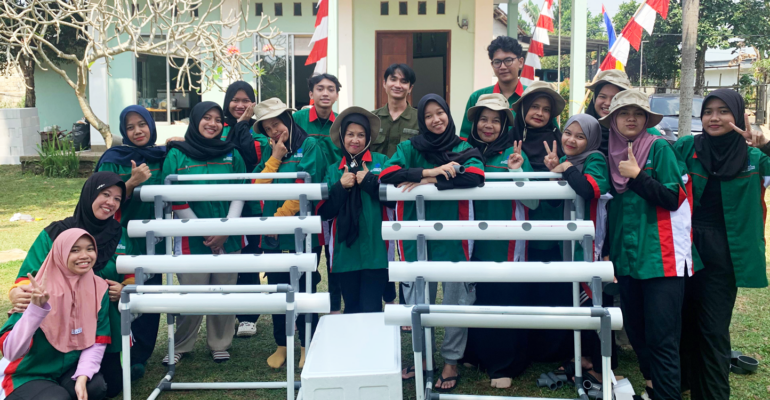PPK Ormawa HMIT IPB University Collaborates with BPVP West Bandung to Prepare Sobat Hejo Cadres Skilled in Hydroponics

Students from the Student Organization Capacity Strengthening Program (PPK Ormawa) of the Soil Science Student Association (HMIT) at IPB University, in collaboration with their partner, the Vocational Training and Productivity Center (BPVP) of West Bandung, organized a training program on hydroponic vegetable cultivation.
Andra Rasel Wijaya, the team leader, explained that this training is part of a program aimed at preparing hydroponic cadres within the ‘Sobat Hejo’ community. This initiative will serve as a form of climate change mitigation and adaptation in Leuweung Kolot Village, Bogor Regency, West Java.
The instructor, I Nyoman Didi Harizena, commonly known as Bli Nyoman, stated that the curriculum consists of 75 percent practical work and 25 percent theory. Gradually, the training participants have undertaken seeding, concentration testing, and the construction of hydroponic installations.
Moreover, there are eight competency units within the curriculum designed by the BPVP West Bandung partner. These include implementing occupational safety, health, and environmental regulations in the workplace; providing nursery infrastructure; installing hydroponic systems; planting crops; designing irrigation systems; installing, monitoring, and maintaining hydroponic systems; and harvesting hydroponic produce.
In addition to the training, the BPVP West Bandung partner incorporated a productivity curriculum and soft skills training, which were highly beneficial for the participants, including members of family welfare empowerment cadres (PKK), posyandu (integrated health service posts), women’s farming groups (KWT), and students.
Several crops were planted, including red lettuce, green lettuce, pagoda, and water spinach. Additionally, the training participants constructed a Deep Flow Technique (DFT) hydroponic greenhouse with 152 planting holes in RW 06, two simple DFT installations with 40 planting holes, and two floating raft hydroponic systems.
Nyoman expressed that the ultimate goal is for participants to become proficient in hydroponic practices. “At a minimum, participants should gain knowledge about hydroponics, carry out cultivation, practice, install irrigation systems, and create nutrients. At the very least, they should be able to plant crops. The key is to practice, even if just at home,” said Bli Nyoman.
The responsiveness of the participants also convinced Bli Nyoman that they were able to grasp the training provided. Rusdiani, one of the PKK members who participated, expressed her delight in attending the hydroponic training. “The training has been very beneficial. We’ve learned so much, especially about hydroponic management. We’ve been guided directly, and any issues were addressed on the spot, so it’s been a hands-on experience, not just theory,” she said.
Upon learning that PPK Ormawa HMIT IPB University would establish a hydroponic institution named Sobat Hejo, the women who participated in the training expressed their readiness to become cadres. Their love for gardening also plays a crucial role in supporting the success of the climate village program in Leuweung Kolot Village. (*/Rz) (IAAS/RUM)



